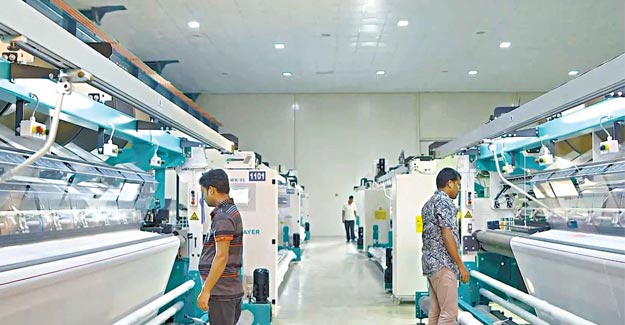
Youngone Making Massive Investment In MMF In Bangladesh
Youngone Corporation, a global conglomerate based in Korea, has made massive investments in man-made fibre (MMF) for clothing in its factories in Bangladesh, as artificial materials are now dominating the fashion industry, according to Kihak Sung, chairman and chief executive officer of the company. Youngone, famous for its outerwear and MMF products, recently started manufacturing polyester fabrics at three factories covering 40,000 square metres each at the Korean Export Processing Zone (KEPZ) in Chattogram. Besides, Japanese engineers will install some new machinery at one of the factories soon, Sung said. Sung decided to invest in MMF products due to their rising demand in the international market. Currently, 95% of all the fibres produced by the company is MMF that is used by its own factories and other local manufacturers for a variety of apparel items. So far, US$ 65 million has been invested in the three factories while another US$ 120 million will be invested to operate five factories in total. Being the largest foreign investor in Bangladesh's garment industry, Youngone plans to invest US$ 1 billion over the next few years. Youngone has already invested around US$ 600 million in Bangladesh. The company is also investing in a solar power development project in an effort to bring 40 MW capacity of clean energy to the KEPZ. Once complete, it will be the world's largest rooftop solar power project. But like other companies, Youngone was also badly affected by the Covid-19 fallout. The company lost about 45% of its yearly export revenue due to order cancellations and was forced to halt production for nearly nine weeks amid all the economic uncertainty. After numerous negotiations, the rate of cancellation was reduced to 15%. On the other hand, the company's Vietnam operations continued to run smoothly. Sung, who started his business in 1974 and set up a garment factory with 450-500 workers in South Korea in 1976, has been doing business in Bangladesh since 1980, when he set up a factory at Agrabad in Chattogram. The company's annual revenue is about US$ 2.5 billion and Sung aspires to increase it considerably. This is why he has been heavily investing in innovative textile and garment production. Currently, Youngone has business operations, particularly textile and garment, in Bangladesh, the US, Vietnam, Korea, Ethiopia, Uzbekistan, El Salvador and Switzerland. The company's biggest offshore operations are in Bangladesh though and Sung has been developing the KEPZ Corporation to invest more progressively in the country. Youngone is the main supplier of down jackets-a soft but very warm outerwear made from MMF and real feathers-in Korea and it is also the main supplier of The North Face products globally. The retention value of quality down jackets in Bangladesh is more than 75% and Youngone is the main producer of this special kind of jacket for cold climates. The product is largely manufactured in Bangladesh. Sung went on to say that Bangladesh's graduation from a least developed country (LDC) to a developing one will erode its trade competitiveness by more than 10% on exports to EU markets. Bangladeshi companies need to improve their productivity by at least 50% as well as reduce costs and lead time to compete in the international market before the country loses its trade benefits. Bangladesh should use Vietnam as a benchmark for how smooth business operations in a country should run, he added. For instance, even a few years ago, there were 7,000 Korean companies, mainly textile and garments related, in Shandong province of China but most of those factories were relocated to Vietnam as it offered good business conditions and administrative support. Bangladesh can learn from Vietnam on how to attract more foreign direct investment, said Sung, who also served as chairman of the Korea Federation of Textile Industries (KOFOTI) and president of the International Textile Manufacturers Federation (ITMF), the world's oldest textile organisation based in Zurich, Switzerland.
Textile Excellence
If you wish to Subscribe to Textile Excellence Print Edition, kindly fill in the below form and we shall get back to you with details.












